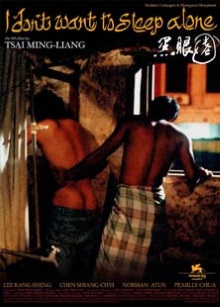
This marks the second film by director Tsai Ming-Liang to be featured on this blog and it’s especially poignant here as it is set in Malaysia. Though he is known as a Taiwanese director and now resides there, he was actually born and raised in Kuching, Sarawak. This one is set in Kuala Lumpur and though it stars his regulars Lee Kang-Sheng and Chen Shiang-Chyi, it also includes a Malaysian amateur, Norman Atun, who had no prior acting experience before this and was apparently spotted by Tsai while working as a food vendor.
Lee plays an apparently homeless man who wanders the streets of downtown KL. After being beaten up by a swindling bomoh and his coterie of followers, he is rescued and nursed back to health by Rawang, a migrant construction worker from Bangladesh. A parallel story deals with the fierce female owner of a coffee shop. She cares for a brain-dead man in a room above the shop, played also by Lee, but it’s uncertain what their relationship is. At the same time, she abuses her live-in maid and waitress, played by Chen, who lives in the tiny attic. Both this waitress and the first homeless man are clearly attracted to each other but it appears that after caring for him for a few days, Rawang has some feelings for him too, though it is ambiguous whether or not this is romantic in nature. This sets up an unusual and uneasy triangle between the three characters, neatly symbolized by their tussle over Rawang’s old but prized mattress.
Writing the above synopsis is a pain because almost none of the characters are named but the narrative is actually much easier to understand than Stray Dogs. There’s almost no dialogue in this film and what little there is is actually in Malay. The only time Chinese is heard is on the radio and I’m impressed by how authentically Malaysian it sounds. I suspect that this is at least partly because the ethnic Chinese leads are really Taiwanese and hearing them talk would destroy the illusion that they are Malaysian. Still, thanks to the superb use of visual storytelling techniques and the performers’ ability to emote their feelings and thoughts, there’s is no difficulty in working out what’s going on. Considering the atrocious level of acting ability that is usually found even in Malaysian films with generous budgets, this makes for a great reminder of the old adage that there are no bad actors, only bad directors who don’t know how to wring the best performances out of his or her performances. This film is unquestionably the best and most naturalistic depiction of urban Malaysia I have ever seen put on screen.
The themes in I Don’t Want to Sleep Alone are fairly obvious but no less powerful for that. Having someone to sleep together with, absent any suggestion that sex of any kind is involved, is a metaphor for the primal need for human companionship. The film even opens with a lengthy and utterly still shot of Lee as the brain-dead man lying alone in the bed: literally no one sleeps with him and so he passes his days in meaningless and senseless existence. This drive for intimacy propels every character in this film and is also ultimately what binds them together. The character of Rawang may or may not be homosexual, but I love how Tsai keeps putting him and the homeless man together in situations that are sexually suggestive, such as the one depicted in the poster above, but are actually asexual once you understand the context.
There are plenty of other touches that I think are nothing short of fantastic. The sight of characters constantly working together to carry the visibly heavy across the streets of KL, including past such recognizable landmarks as the now demolished Pudu Prison, is simultaneously funny and sad. Near the end of the film, Tsai uses the now annual haze season in Malaysia to accentuate even further the alienating effects of life in the city. The smoke seeps into the coffee shop despite the layer of plastic sheeting at the entrance and people can forced to wear face masks, humorously even during sex. These might be aspects of life in Malaysia that are uncomfortable for the government to acknowledge but it is their absence is most local films that make them feel so sterile and soulless. That said, I think that in line with his penchant for filming scenes of urban squalor. Tsai exaggerates the poverty of the characters. Coffee shops earn plenty of money after all. I find it impossible to believe that a pretty young Malaysian Chinese girl would accept employment under such deplorable conditions in KL as depicted in this film. There’s a strange sense of incongruity as well as to exactly which time period the film is set in. The presence of Bangladeshi migrant workers point to this being fairly recent yet the music from the radio as well as the decor of the quarters above the coffee shop hearken back to earlier times.
Overall this is still far and away the best portrayal of life in KL that I’ve ever seen on film and I believe that all Malaysians will enjoy watching this. I only wish that Tsai had focused more on the Malay residents of the city such as those seen at the beginning of the film. I understand however that this would probably make it even more difficult for the film to get government approval. As it is, I’m mildly shocked that both the Kuala Lumpur City Hall and FINAS apparently cooperated with the project.
2 thoughts on “I Don’t Want to Sleep Alone (2006)”